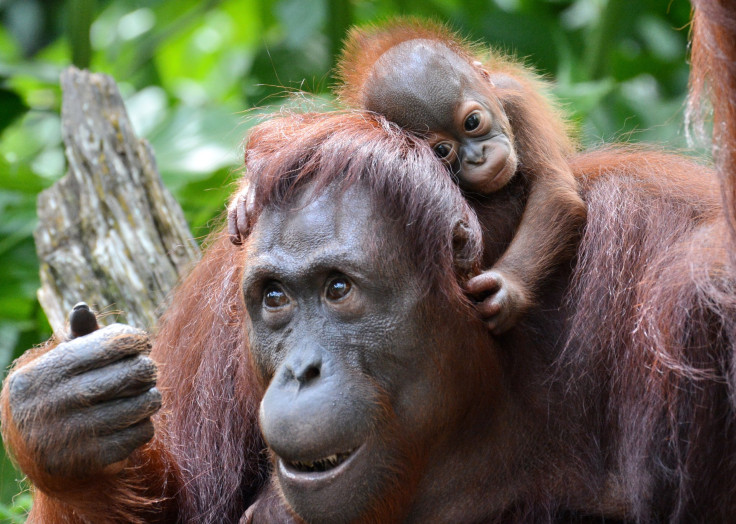Bornean Orangutan Now ‘Critically Endangered’: IUCN

The International Union for Conservation of Nature (IUCN) this week announced that the Bornean orangutan, one of the only two remaining species of the great ape — the closely related Sumatran orangutan being the other — is now a “critically endangered” animal. The assessment is only one step away from the species being declared “extinct in the wild,” which is the precursor to being entirely extinct from the planet.
The numbers of the Bornean orangutan in the wild are in decline; they fell by 60 percent in the 60 years since 1950, and IUCN predicts a further 22 percent decline from 2010 to 2025. The organization said the “sharp decline” is chiefly attributable to “destruction, degradation and fragmentation of their habitats, and hunting.”
Among all great ape species, orangutans are the most arboreal — they spend most of their time in trees, and certainly more than all other great apes. That makes them particularly vulnerable to destruction or degradation of forests. In Borneo — the third-largest island in the world, it is shared by Brunei, Indonesia and Malaysia — much of the destruction of their native habitat comes from conversion to plantations and logging.
While the governments of all three countries have declared most of the island’s rainforests protected areas, illegal logging for timber and burning of land to clear it for plantations are both continuing dangers to the orangutan’s natural habitat. According to the latest assessment, about 104,700 individuals of the species are estimated to be still living in the forests of Borneo.
The issue is further complicated by the mating behavior of the species. According to the IUCN Red List of Threatened Species, where Bornean orangutan now features, these animals “are very slow breeders and produce on average one offspring every 6 — 8 years.” The slow breeding cycle — among the longest for any land mammal — makes them particularly vulnerable to hunting.
The Sumatran orangutan was declared “critically endangered” in 2008.
However, Andrew Marshall, one of the authors of the recent assessment, does not think that orangutans will necessarily go down the extinction road. He told Mongabay that the species are more adaptable than previously thought, and that if commitments to prevent further degradation of their habitat are properly enforced, their numbers could improve.
“Although I think things will likely get worse before they get better, it’s not too late for orangutans,” Marshall said.
Orangutans and humans share approximately 97 percent of their DNA make-up. They are a highly intelligent species, one of the smartest among primates. A study conducted by the Leipzig Zoo in Germany in 2008 showed orangutans were capable of analyzing the benefits and costs of exchanging gifts, and also of keeping track of them over time, making them the first non-human species that has been observed doing so. They can also use tools and use a variety of sounds to communicate.
© Copyright IBTimes 2024. All rights reserved.




















